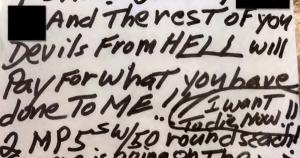OREGON
Benjamin Jaramillo Hernandez, 70, of Eugene, Oregon, was sentenced Wednesday to 15 months in federal prison for committing a hate crime targeting St. Mary Catholic Church in Eugene in September 2018 and illegally possessing ammunition, according to officials.
“Threats of violence and hateful intimidation will not be tolerated by the Department of Justice,” said Assistant Attorney General Eric Dreiband.

“Mr. Hernandez used intimidation and threats of violence to terrorize a single congregation, but the harm from hate crimes like this extends beyond the specific individuals or group targeted. These crimes threaten the security, freedom, and well-being of entire communities,” said Billy J. Williams, U.S. Attorney for the District of Oregon. “No conviction can reverse the harm caused by Mr. Hernandez, but we hope it provides some measure of justice to St. Mary parishioners and the entire Eugene community.”
“Our right to worship freely and without fear is fundamental to life in America,” said Renn Cannon, Special Agent in Charge of the FBI in Oregon. “Whatever your faith, the FBI and our partners will work to protect your right to express your beliefs and live in peace.”
According to court documents, on Sept. 9, 2018, Hernandez was escorted from St. Mary property following an angry outburst during the sacrament of communion.
Five days later, on September 14, a church employee reported to the Eugene Police Department that someone had dispensed pepper spray on the exterior door handles and through the mail slot of the St. Mary office front door.
Employees reported burning sensations in their fingers and respiratory distress. A Eugene police officer and FBI agent identified Hernandez in church surveillance footage as the person responsible for both incidents, according to officials.
On Sept. 16, 2018, Hernandez was again spotted near St. Mary. A witness saw Hernandez across the street from the church when he stopped near the Eugene Public Library and shouted at the witness, “I’ve got something for you right here,” while pointing to a bag he was carrying.
A few days later, on September 20, St. Mary employees reported finding a threatening note and seven 10mm Sig hollow point bullets left in the office.
The note threatened the church with “2 MP5s w/ 50 rounds each,” a type of submachine gun. The note concluded: “Eugene is going on the [expletive] map.”
A Eugene police officer again reviewed church surveillance footage and identified Hernandez as the individual who dropped off the note and bullets.
On Sept. 21, 2018, Eugene Police arrested Hernandez at the Eugene Public Library. During a search of Hernandez’s person, officers located a partially empty can of pepper spray, three .410 shotgun shells, and thirteen 10mm Sig hollow point bullets. The 10mm bullets were the same brand and caliber as the bullets left at St. Mary with the threatening note.
On Feb. 12, 2019, Hernandez pleaded guilty to a two-count Information charging him with obstruction or attempted obstruction of persons in the free exercise of their religious beliefs and unlawful possession of ammunition.
St. Mary Catholic Church staff and parishioners have reported that Hernandez’s threats have left staff and churchgoers physically injured, frightened, concerned about their own safety and unable to participate freely in the exercise of their religious beliefs.
The harassment has not only affected individual parishioners but the parish as a whole. Multiple members of the St. Mary community have reported that the church has experienced a drop in attendance and in weekly collections after Hernandez’s conduct.
NOTE
This case was investigated by the Eugene Police Department and the FBI and prosecuted by Gavin W. Bruce, Assistant U.S. Attorney for the District of Oregon, and Cameron Bell, Trial Attorney for the Civil Rights Division.
For more information about Department of Justice’s work to combat and prevent hate crimes, visit www.justice.gov/hatecrimes: a one-stop portal with links to Department of Justice hate crimes resources for law enforcement, media, researchers, victims, advocacy groups, and other organizations and individuals.

